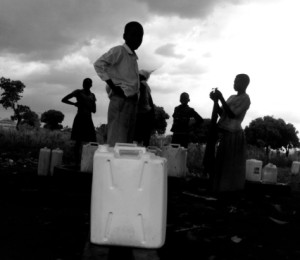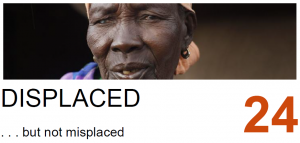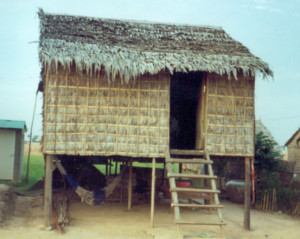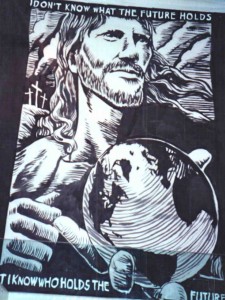
Today’s blog post comes from our new book, Trampled Grass.
Learn how you can download a free copy or buy your autographed copy at www.creekbank.net
This story, “Misplaced” has been on my mind all week. These words are so pertinent during this time of crisis in Louisiana.
I am a refugee torn from my land,
Cast off to travel this world to its end. Never to see my proud mountains again But I still remember them.
“I am a Wanderer”
–Steve Earle
So often seemingly similar words have totally different meanings.
One word can soothe, while a similar word can irritate.
A word may unite. another word leads to division.
On my first trip to Asia, I quickly learned that there is a word you use carefully.
Refugee.
According to the United Nations, a refugee is someone who has crossed a national border to escape war, famine, or natural disaster.
A person who is still in their country but has moved due to the above factors is considered a displaced person, not a refugee. They’re called IDPs. Internally Displaced Persons. Government officials are very sensitive
As in Internally Displaced Persons. Government officials are very sensitive
Government officials are very sensitive on this issue. They are displacees, not refugees.
Back in 2002 as I stood amidst a dusty, hastily built Displaced Camp in the floodplain north of Phnom Penh, Cambodia, our host, Mickey, kept reminding us not to call it a refugee camp.
Mekong River Displaced Persons Camp Cambodia
During our trip to the Indonesian tsunami areas we visited many Displaced Person Camps. Some were pretty nice while others were primitive and unsanitary.
Those who fled Katrina and then Rita were called evacuees, even though they were displaced persons. Don’t ask me the difference. But they weren’t and aren’t refugees.
However, there is a point of clarification I wish to make. They’ve been displaced.
But they have not been misplaced.
The American Heritage dictionary defines misplaced as “put in a wrong place” or “place (something) where one cannot find it again.”
It means you cannot find something and don’t remember where you left it.
Recently, I couldn’t find my truck keys. They were misplaced somewhere. Later on, I found them—right where I’d misplaced them while preoccupied with this story.
However, displaced carries a completely different connotation. It means moved but not forgotten or lost.
At some times in our lives, we all become displaced.
It doesn’t take a hurricane, tsunami, or civil war. It can be a job change, a family tragedy, cancer, an illness, a financial setback, persecution from without or even from within.
All of a sudden we realize we are somewhere we did not expect to be. We’ve been displaced.
I’ll never forget the morning of Tuesday, August 30, 2005. Early that morning I sat with several hundred New Orleans evacuees from Hurricane Katrina. They were staying at Dry Creek Baptist Camp in my Louisiana hometown.
The news the day before had been spotty. Parts of greater New Orleans were underwater but one headline read, “New Orleans Dodges Bullet.”
That headline crashed Tuesday morning as television videos showed most of the city being flooded. Several key levees had collapsed. As news anchors mentioned the breached canals at 17th Street, New London Avenue, and Industrial Canal, these displaced evacuees knew their homes were now under water.
They knew that their expected evacuation of several days was being washed away by the murky waters of Lake Ponchartrain.
They were displaced—no home to return to. At least for now . . .
And maybe forever.
Being displaced is bad.
It’s tough.
But it is not the same as being misplaced. If I misplace you, I forget where I’ve “laid you down.”
If I displace you, I’ve moved you but I know exactly where you are. Scripture is chock full of folks being displaced.
Father Abraham leaves home for a place God promises to show him.
Later his great-grandson Joseph is displaced to Egypt. This tragedy of betrayal, enslavement, and prison results in a tidal wave of forgiveness and reconciliation. We realize God allowed for Joseph’s displacement to save the Jewish race.
His words to his brothers, “What you meant for evil, God meant for good” in Genesis 50:20 are a strong testimony to this displaced/but not misplaced juxtaposition.
Several centuries later, one of the greatest heroes of the Old Testament appears. His name is Daniel. He is an example of courage, coolness under pressure, and commitment to his own value system.
Daniel is displaced. That is the main story of this book in the Bible. As a young boy, his homeland of Israel is overrun by the Babylonians and Daniel is exiled to live in a foreign kingdom.
Except Daniel never forgets where he came from.
His belief in God and commitment to do what is right is shown in all he does. This leads him to advance to the inner circle of the Palace.
When the Persian King Darius overthrows the Babylonians, Daniel’s character endears him to the new ruler.
In Chapter 6 of Daniel, he becomes the victim of an evil plot by jealous associates of King Darius.
Daniel breaks the King’s edict that no one can pray to anyone but him. Daniel, committed to praying three times daily, is arrested and thrown into the den of lions.
Talk about displaced!
He was taken from his boyhood home, had his name changed to the beautiful tongue-twister of “Belteshazzar,” gone from one kingdom to another, and now is thrown into the den of lions.
But he was only displaced. Not misplaced.
God allowed him to be displaced. Now don’t ask me to explain all about the “permissive will” of God. I do not understand why God allows his people to be dumped right into the middle of terrible situations.
Displaced but never forgotten.
The next morning when Darius, who has fasted and prayed all night, comes running to the lion’s den, Daniel is safe and whole.
Daniel succinctly replies, “My God sent his angel, who closed the mouths of the lions.”
Yes, God knew right where Daniel was.
And as always He was faithfully there with him.
We could go on and on with these displaced heroes of the Bible. Isaiah. Jeremiah. Nehemiah. Even seafarer Jonah.
Best of all, our Savior Jesus spent time displaced: born away from home in Bethlehem. Carried to Egypt. His public ministry is one of constant displacement: “The Son of Man has no place to lay his head.”

Many of our refugee friends have no idea when they’ll return to their beloved land of South Sudan.
Some may never return.
None of us can reach into the future.
But we serve a God who can and does.
As one of our Ugandan friends repeats, “God’s delay is not God’s denial.” Can we be displaced?
You bet.
Misplaced?
Never in a million years.
Not only does God know right where you are, He is present with you. Jesus promised: I will never leave nor forsake you.
That’s good enough for me.
With faith, it can be good enough for you.
Displaced?
Maybe.
Misplaced by God? No way.
Not in a million years.
“I know Who holds the future.”
 Creekbank Stories Curt Iles, Storyteller
Creekbank Stories Curt Iles, Storyteller



